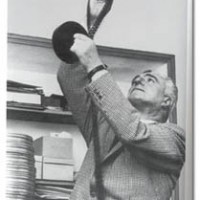Vittorio De Sica
07.07.1901, Sora, Italy - 13.11.1974, Paris, France

feeling for small life details. Apart from that, in his works he collaborated with nonprofessional actors and often shot in natural ambiences (in real locations). All that fits perfectly into the neorealist tendencies that dominated the Italian film after the WW 2. With his four masterpieces - Sciuscia (1946), Ladri di biciclette (1948), Miracolo a Milano (1951), Umberto D (1952) – he became the main representative of neorealism. Cesare Zavattini was in all the aforementioned films, the co-screenwriter. It is important to say
that Umberto D is often called the transitive film between the classical neorealism and the so called neorealism of the soul. Slowly neorealism started to fade away (beginning of 50’s) and De Sica’s directing
career is in crisis, so once again he returns to acting. He had a few impressive roles in films such as Madame de... (1953) and General Della Rovere(1959). Also, he wins back the audience by a series of films Pane, amore
e fantasia (1953) and Pane, amore e gelosia (1954). In 1954 he shot a
commercially successful film L'Oro di Napoli (1954) and a year later Il tetto, his last neorealist film. In his later phase the most significant titles include: La Ciociara (1960), Il giudizio univerzale (1961), Matrimonio all'italiana (1964), Il Giardino dei Finzi-Contini (1970), Una breve vacanza (1973). In 1974 he made his last film Il
viaggio. In his directing career De Sica won four Oscars.
Filmography
Il Viaggio (1974)
Una Breve vacanza (1973)
Lo chiameremo Andrea (1972)
Le Coppie (omnibus; part: Il Leone) (1970)
Il Giardino dei Finzi-Contini (1970)
I Girasoli (1970)
Amanti (1968)
Sept fois femme (1967)
Le Streghe - Una Sera come le altre (1966)
Caccia alla volpe (1966)
Un monde nouveau (1966)
Matrimonio all'italiana (1964)
Ieri, oggi, domani (1963)
Il Boom (1963)
I Sequestrati di Altona (1962)
Boccaccio '70 (omnibus; part:La riffa) (1962)
Il Giudizio universale (1961)
La Ciociara (1960)
Anna di Brooklyn (1958)
Il Tetto (1956)
L' Oro di Napoli, (1954)
Stazione Termini (1953)
Umberto D. (1952)
Miracolo a Milano (1951)
Ladri di biciclette (1948)
Porta del cielo, La (1946)
Sciuscia (1946)
I Bambini ci guardano (1944)
Un Garibaldino al convento (1942)
Teresa Venerdě (1941)
Maddalena, zero in condotta (1940)
Rose scarlatte (1939)